Law Firms Going Global in Japan
Back to Contents of Issue: January 2003
|
by Mayumi Saito |
|
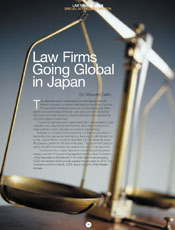 THE JAPANESE PUBLIC, TRADITIONALLY much less litigious than the Western standard, is currently rethinking the role of law in society. TV quiz shows featuring lawsuits are increasingly popular. More law firms are advertising on the train, and some are even distributing free tissue by the train stations, preaching that the most vulnerable citizens need legal empowerment. THE JAPANESE PUBLIC, TRADITIONALLY much less litigious than the Western standard, is currently rethinking the role of law in society. TV quiz shows featuring lawsuits are increasingly popular. More law firms are advertising on the train, and some are even distributing free tissue by the train stations, preaching that the most vulnerable citizens need legal empowerment. The lack of legal recourse in Japan stems from cultural issues, a lack of lawyers and cheap settlement methods. More than 80 percent of rural residents in Japan still have no access to legal services. However, to correspond to an evermore complex society, which is becoming more diverse and international, the Koizumi administration set up the Judicial Reform Council in December 2001 to drastically revise the Lawyers Law for the first time in 54 years. The government plans to submit the bill to the ordinary Diet session that starts in January 2003. 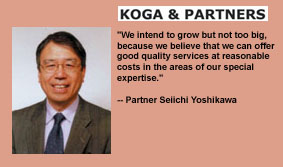 The bill promotes a faster, fairer and more familiar judicial system, easing a number of long-standing regulations by the Japan Federation of Bar Associations (Nichibenren). If the draft revisions are accepted, 3,000 new lawyers will be annually passing the bar exam by 2010. The number is currently limited to 1,000, about one-tenth of the Western average.
The bill promotes a faster, fairer and more familiar judicial system, easing a number of long-standing regulations by the Japan Federation of Bar Associations (Nichibenren). If the draft revisions are accepted, 3,000 new lawyers will be annually passing the bar exam by 2010. The number is currently limited to 1,000, about one-tenth of the Western average.To change the lengthy judicial process, the court system will be reformed, adding more prosecutors and judges, improving public defense for those in need and strengthening other areas of expertise. Lawyers will also be allowed to compete among each other and engage in profit-seeking activities without first getting the local bar association's permission. "The traditional belief has been that the legal profession is a profession, not a trade. Lawyers have been looked up to like priests," says Seiichi Yoshikawa, an attorney with Koga & Partners who is also actively involved in the bar assocication's activities. Although judicial reform has little influence on the daily practice of each law firm, restrictions on their business advertisements, which was once limited to periodicals, will be further eased, he explains. Another focus of judicial reform is internationalization of the Japanese legal industry. Despite the globalizing corporate culture, the number of Japanese lawyers ( bengoshi ) who can handle international transactions is extremely limited. Koga & Partners has been involved in cross-border practices since Masayoshi Koga founded the firm in 1970. Three of the partners are armed with MCLs from US law schools and have been practicing corporate law, international litigation, bankruptcy and general practice. Koga & Partners, with a total of 10 attorneys, has been offering quality services at reasonable costs to prominent and medium-sized Japanese and foreign companies. The firm's other service areas include corporate reorganization and bankruptcy. 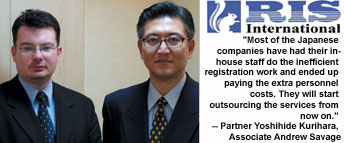 RIS International is another internationally-minded local firm, which is especially confident in handling immigration issues, real estate investment and corporate registration for foreign startups in Japan. RIS started operating as a joint venture of five partners in 1999, each with licensed expertise in different fields: legal registration, court documentation, real-estate brokering, appraisals, tax and accounting.
RIS International is another internationally-minded local firm, which is especially confident in handling immigration issues, real estate investment and corporate registration for foreign startups in Japan. RIS started operating as a joint venture of five partners in 1999, each with licensed expertise in different fields: legal registration, court documentation, real-estate brokering, appraisals, tax and accounting.Boasting one-stop legal services, the firm targets medium-sized businesses that are cost-sensitive. "Not many law firms are dedicated to medium-sized corporations. We are a pioneer in this niche market. Although we're still not recognized as much as we'd like to be, client demand is high thanks to a globalizing economy," partner Yoshihide Kurihara says. For example, he says, the firm has helped small Japanese companies engaged in international transactions such as buying the product licenses of US corporations. Despite the growing opportunities, competition is still not too severe for the young firm because of the limited number of business lawyers with their specialty. RIS International is establishing itself as a efficient service supported by strong teamwork. 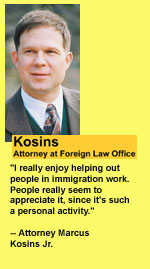 American lawyer Marcus Kosins has represented Japanese businesses since 1986. For seven years now he has been a foreign attorney (gaiben) with an office in Tokyo doing international commercial work and he is the only U.S. attorney in Japan with expertise in obtaining U.S. work and immigrant visas.
American lawyer Marcus Kosins has represented Japanese businesses since 1986. For seven years now he has been a foreign attorney (gaiben) with an office in Tokyo doing international commercial work and he is the only U.S. attorney in Japan with expertise in obtaining U.S. work and immigrant visas.Kosins notes that "September 11 has made it difficult to obtain U.S. visas. As a result businesses now see the value of using a U.S. attorney to obtain U.S. work visas." Kosins spends considerable time on such cases these days. A portion of his work is for inbound foreign businesses setting up operations here or needing other legal assistance. This work often involves Japanese domestic law, which gaibens can not do. So Kosins often must find capable Japanese lawyers (bengoshi) for his clients. Over the years he has built up relationships with several talented bengoshi he can depend on. Backed by a strong, capable staff, Kosins is perfectly comfortable working independently. Still, as co-chair of the Legal Services Committee of the American Chamber of Commerce in Japan (ACCJ), he is an active proponent for unrestricted freedom of association between bengoshi and gaiben. Kosins hopes that significant change on this issue will occur soon as it will benefit both Japanese and foreign business who can then receive fully integrated legal services. This is not possible currently under the present regime of laws regulating gaibens and bengoshi, even though the laws were amended to allow them to work together through a specificed joint enterprise system (tokutei kyodo jigyo). Unfortunately, restrictions in the law effectively prevents the joint enterprise system from fostering fully integrated legal services. As a result, these restrictions minimize the number of foreign lawyers in Tokyo in comparison with other international financial hubs. And the shortage of foreign lawyers here is one of the reasons why there are few bengoshi with international legal training and expertise, according to the recent ACCJ Viewpoint on this topic. Lovells' Managing Partner, Michael Hancock, who chairs the EBC's Legal Services Committee, has been an active reform campaigner and confidently expects that changes will be made soon through the on-going judicial reform process. "The British Embassy and the EC Delegation have provided very effective lobbying support", he comments. Lovells, based in London, has 26 offices worldwide and has been operating in Tokyo since 1990, helping governments, international banks and multinational businesses. Whilst Hancock specializes in banking, projects and structured trade finance, fellow partner, Tim Lester, leads the capital markets and securitization team. Other services Lovells offers include an intellectual property group headed by Lloyd Parker as well as specialist litigation and arbitration advice.  Until the economic downturn really took hold in 1998, the Lovells Tokyo Office had almost exclusively handled outbound work for Japanese companies investing overseas. With the influx of foreign capital, the in-bound work has boomed--as has the capital markets practice. Lovells is actively seeking to tie up with Japanese lawyers and hopes the new legislation will facilitate this. Hancock and Lester are both fluent in Japanese, and the Tokyo office encourages long-term commitment to Japan. The firm regularly seconds its lawyers to Japanese companies believing in the benefits of total cultural immersion. "We drink lots of green tea with our clients", Hancock jokes.
The office has a very collegiate atmosphere helped by what Hancock describes as "a lack of hierarchy and lots of socialising together."
Until the economic downturn really took hold in 1998, the Lovells Tokyo Office had almost exclusively handled outbound work for Japanese companies investing overseas. With the influx of foreign capital, the in-bound work has boomed--as has the capital markets practice. Lovells is actively seeking to tie up with Japanese lawyers and hopes the new legislation will facilitate this. Hancock and Lester are both fluent in Japanese, and the Tokyo office encourages long-term commitment to Japan. The firm regularly seconds its lawyers to Japanese companies believing in the benefits of total cultural immersion. "We drink lots of green tea with our clients", Hancock jokes.
The office has a very collegiate atmosphere helped by what Hancock describes as "a lack of hierarchy and lots of socialising together." 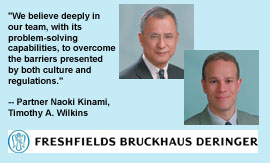 Freshfields Foreign Law Office and Freshfields Law Office is a successful example of a joint enterprise created after the legal deregulation. More than 40 lawyers (27 Japanese bengoshi and 13 foreign lawyers) provide Japanese, English and US legal advice on a wide range of financial, corporate and commercial matters.
Freshfields Foreign Law Office and Freshfields Law Office is a successful example of a joint enterprise created after the legal deregulation. More than 40 lawyers (27 Japanese bengoshi and 13 foreign lawyers) provide Japanese, English and US legal advice on a wide range of financial, corporate and commercial matters."Our strength is the transactional experience of our Japanese and foreign lawyers," says partner Timothy A. Wilkins. "We work as an integrated practice to provide commercial advice on complex legal issues facing our clients". Freshfields boasts in-depth local legal knowledge for both its international clients in Japan, as well as for Japanese clients looking overseas. Managing partner, Naoki Kinami, explained to us the firm is highly selective in recruiting quality lawyers and devotes large resources to further their training. "Associate development programs include regional and practice area conferences and overseas study at U.S. law schools followed by training in London, New York or another Freshfields office." With offices worldwide, Freshfields Bruckhaus Deringer is widely acknowledged as one of the strongest international corporate law practices in M&A, securities and joint ventures. Morrison & Foerster, founded in San Francisco in 1883, was one of the first law firms to establish a Tokyo office when the laws changed in 1987 to permit foreign lawyers to practice in Japan. In April 2001, Morrison & Foerster formed a joint enterprise with Ito & Mitomi, led by Fuyuo Mitomi, one of Japan's most respected securities lawyers. Now armed with over 45 resident US, Japanese, British and Australian-qualified lawyers, the joint enterprise provides a unique range of services focusing on global business and litigation matters for its largely domestic and foreign clientele. On the corporate side, the firm's Tokyo practice has been particularly active in inbound and outbound M&A, securities offerings, joint ventures, private equity, licensing and technology transactions. On the litigation side, a dozen Tokyo-based, US-qualified litigation attorneys, many of whom are bilingual, let Morrison & Foerster clients confer directly with US litigators about strategy and tactics for cases pending in the US and elsewhere. "We look forward to additional reforms to facilitate M&A and foreign direct investment, which can help to fuel Japan's economic recovery," partner Chuck Comey says of Japan's current legal environment. 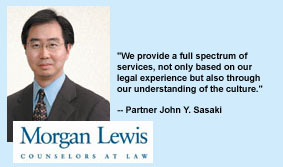 Morgan Lewis, with 13 offices worldwide, has represented Japanese cross-border interests for more than 50 years. The firm's Tokyo office opened in 1988. To support Japanese companies in their investments in and trade with the U.S. Morgan Lewis has recently expanded its operations in Tokyo, adding three attorneys in 2002, and now also represents international clients' interests in Japan.
Morgan Lewis, with 13 offices worldwide, has represented Japanese cross-border interests for more than 50 years. The firm's Tokyo office opened in 1988. To support Japanese companies in their investments in and trade with the U.S. Morgan Lewis has recently expanded its operations in Tokyo, adding three attorneys in 2002, and now also represents international clients' interests in Japan. The three bilingual partners and two associates in the Tokyo office have diverse practice areas, and backed by a fully integrated global law firm, "we have not only breadth of practice but also depth of practice," says partner John Y. Sasaki. He is committed to helping the venture community grow in Tokyo and plans to use the experience he gained while in Silicon Valley from 1997 to 2002. Although many consider Japan's startup community dead after the Internet hype of 1999, Sasaki insists that there is still tremendous energy here. He is building an international network of entrepreneurs, venture capitalists, and technology (from university labs and big corporations), leveraging his network in the venture community in Japan from his Silicon Valley days and Morgan Lewis' historical relationships with large Japanese corporations. An important strength offered by Morgan Lewis to foreign corporations seeking to do transactions in Japan is its wide network of Japanese law firms. Through this network, the Tokyo office can match the specific needs of the client with the best legal teams in Japan. In the same way, it can assist with transactions in South Korea, China, Taiwan and throughout Southeast Asia. 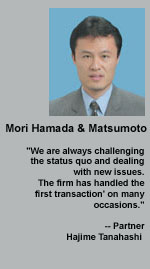 Mori Hamada & Matsumoto is another full-service law firm capable of advising both large multinational corporations and startups from Japan or elsewhere. The firm was formed through a merger on December 1, 2002, of 53-year-old Mori Sogo and 30-year-old Hamada & Matsumoto.
Mori Hamada & Matsumoto is another full-service law firm capable of advising both large multinational corporations and startups from Japan or elsewhere. The firm was formed through a merger on December 1, 2002, of 53-year-old Mori Sogo and 30-year-old Hamada & Matsumoto. "We are always challenging the status quo and dealing with new issues," partner Hajime Tanahashi says, who worked at a major law firm in Silicon Valley. The firm of 160 attorneys has handled the "first transaction of its type in Japan" on many occasions, representing clients in rapidly developing technology fields, such as telecommunications and information services. Tanahashi sees the series of amendments to the Japanese Commercial Code in 2001 and 2002 as the most drastic changes in the last 50 years. "We now have a much better legal and regulatory environment for startups and venture capital," he says. And by closely following the amendments, he says, "We have fully utilized the new rules in real-world transactions." Attorney Glenn Newman has been representing American and other companies operating in Japan since 1990. For five years before establishing the Newman Law Office, he was associate general counsel responsible for Japan and Asia-Pacific Affairs for Cadence Design Systems, a major Silicon Valley-based software and electronic engineering services company.  He operates his office from the US and travels to Japan at least on a quarterly basis. Newman Law Office provides transactional, "legal infrastructure" development, and dispute resolution services. He focuses on representing mainly US and Japanese technology companies in the software, wireless, IP development, engineering services and technology distribution industries.
He operates his office from the US and travels to Japan at least on a quarterly basis. Newman Law Office provides transactional, "legal infrastructure" development, and dispute resolution services. He focuses on representing mainly US and Japanese technology companies in the software, wireless, IP development, engineering services and technology distribution industries."Clients gain from a single experienced point of contact who is directly responsible and accountable for all matters," Newman says. "We are optimized to provide business-oriented legal services quickly and cost-effectively." Newman also boasts strong relationships with local counsel in most major business centers in the Asia-Pacific region, with especially close ties to excellent local attorneys in Japan, China and Taiwan. Newman considers the pace of reform of the Japanese legal system to still be too slow, though he is encouraged by the recent overhaul of the Commercial Code. Yet, he observes more openness to new ideas in the corporate world. "This presents both opportunities and challenges for foreign companies. Combining this new receptivity to change and innovation with the vaunted Japanese attention to detail could create a powerful one-two punch," he says.  Haarmann, Hemmelrath & Partner is a multi-disciplinary German firm that's expanded to 23 offices worldwide since 1987. Its Tokyo office was founded in 1994 to service Japanese investors in Europe and later the increasing number of German corporations, setting up in Japan. Their investment practice hit a peak in 1999-2000 with the opening of the Japanese market and changed to a more reorganizational type of practice since then because of the worldwide economic downturn.
Haarmann, Hemmelrath & Partner is a multi-disciplinary German firm that's expanded to 23 offices worldwide since 1987. Its Tokyo office was founded in 1994 to service Japanese investors in Europe and later the increasing number of German corporations, setting up in Japan. Their investment practice hit a peak in 1999-2000 with the opening of the Japanese market and changed to a more reorganizational type of practice since then because of the worldwide economic downturn. Partner Thomas Witty says: "We have an equal number of lawyers, tax advisers and accountants." Haarmann Hemmelrath covers all the integrated services needed to execute transactions, specifically in the areas of M&A, company restructuring, stock market flotations, private equity and venture capital. German corporations constitute 70 percent of the firm's clients, while the other 30 percent are Japanese. Many German clients demand flexibility to expand their investments, according to Witty. Japanese clients are, on the other hand, still hesitant and take their time to make investments. But Witty observes that many Japanese clients are becoming more sophisticated. They are now expecting a full range of services and asking for more specific advice, he says. Haarmann Hemmelrath, although having established a formal alliance with two Japanese lawyers one year ago, still sees a challenge in finding local partners with the proper level of business entrepreneurship. "Many Japanese law firms are still old fashioned and not very business oriented," Witty says. While the law firms above have been providing advanced services to a borderless corporate world, the Judicial Reform Council is only now finally updating the Japanese legal system to international levels. The submitted bill will hopefully facilitate the freedom of association between Japanese and foreign lawyers, promoting further deregulation of their joint enterprises and partnership formation. The reform, if effective, will strengthen Japan's legal infrastructure for cross-border transactions, international arbitration and intellectual property development, as well as produce more competent bengoshi to service international clients. Today, business is global, and the law must be too. n |
|
Note: The function "email this page" is currently not supported for this page.






